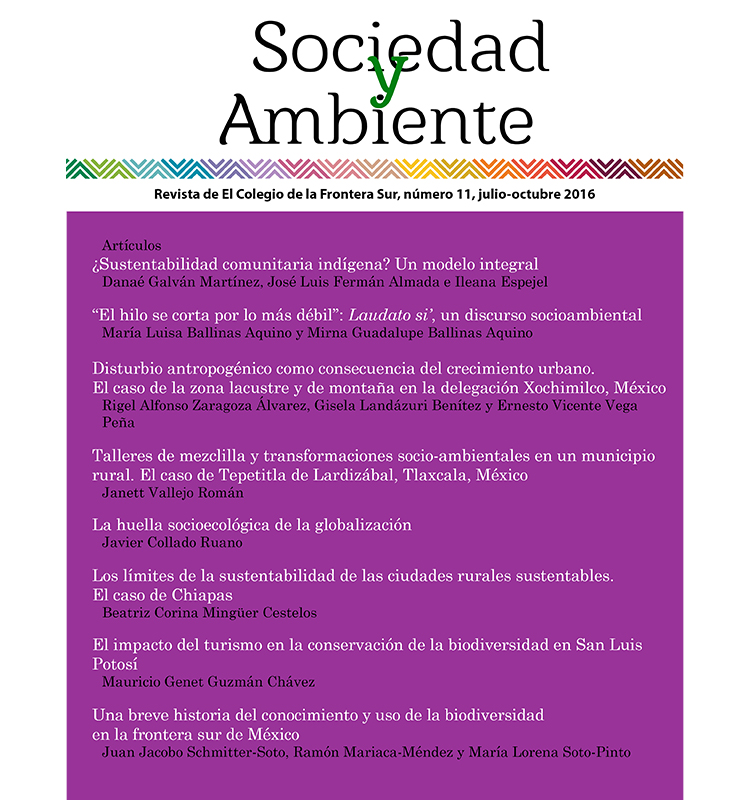Resumen
El presente artículo tiene como objetivo principal estudiar la enorme huella socioecológica de la globalización, con la intención de ayudar a alcanzar los “Objetivos de Desarrollo Sostenible” (ODS), propuestos por las Naciones Unidas, con metas al año 2030. Se trata de un ensayo teórico de revisión crítica a la literatura concerniente a las consecuencias humanas y ambientales de la globalización. Por lo tanto, se discuten las consecuencias antropogénicas del cambio climático en marcha y su impacto socioecológico. En suma, se concluye que el modelo económico globalizador impuesto desde occidente resulta incompatible con el equilibrio de las leyes biofísicas de la naturaleza, por lo que se requiere una profunda transformación civilizatoria de la actividad humana para conseguir los ODS.
Citas
Bakan, Joel (2004). The Pathological Pursuit of Profit and Power. Toronto: Viking Canada.
Bauman, Zygmunt (1999). Globalização. As consequências humanas. Rio de Janeiro: Zahar Ed.
Beck, Ulrich (2008). La sociedad del riesgo mundial. En busca de la seguridad perdida. Barcelona: Paidós.
Bentley, Matthew (2003). Sustainable Consumption: Ethics, National Indices and International Relations (doctoral theses), American Graduate School of International Relations and Diplomacy, París.
Castoriadis, Cornelius (1980). “Reflexiones sobre el desarrollo y la racionalidad”, en Jacques Attali, Cornelius Castoriadis, Jean Marie Domenach (coords.). El mito del desarrollo. Barcelona: Kairós.
Collado Ruano, Javier (2015). “Biomimicry: A Necessary Eco-Ethical Dimension for a Future Human Sustainability”, en Future Human Image, 2 (5), pp. 23-57.
Collado Ruano, Javier (2016a). Epistemología del sur: una visión descolonial a los Objetivos de Desarrollo Sostenible. Sankofa. Revista da História da África e de Estudos da Diáspora Africana. Nº 27, pp. 137-158.
Collado Ruano, Javier (2016b). La bioética como ciencia transdisciplinar de la complejidad: una introducción coevolutiva desde la Gran Historia. Revista Colombiana de Bioética. Vol. 11, Nº 1, pp. 54-67.
Cook, Earl F (1971). “The Flow of Energy in an Industrial Society”. En Scientific American, nº3, 225, pp. 134-137.
Dussel, Enrique (2006). Ética de la liberación en la edad de la globalización y la exclusión (5ª edición). Madrid: Ed. Trotta.
FAO (Food and Agriculture Organization) (2014). Food Insecurity in the World 2014. Rome: FAO.
Gore, Al (2006). An Inconvenient Truth. The Planetary Emergency of Global Warming and What We Can Do About It. New York: Rodale.
Gore, Al (2013). The Future. Six Drivers of Global Change. New York: Random House.
GREENPEACE (2015). Ecological Farming. The seven principles of a foodsystem that has people at its heart.
Hathaway, Mark, Leornardo Boff (2014). El Tao de la liberación. Una ecología de la transformación. Madrid: Trotta.
Herman, Edward, Robert MacChesney (2004). The Global Media: The New Missionaries of Corporate Capitalism. London: Continuum.
Intergovernmental Panel on Climate Change (IPCC) (2001). Climate change 2001: Impacts, Adaptation, and Vulnerability. New York: Cambridge University Press.
Intergovernmental Panel on Climate Change (IPCC) (2014). Climate Change 2014: Impacts, Adaptation, and Vulnerability. New York: Cambridge University Press.
Kopp, Robert, Andrew Kemp, Klaus Bitterman, Horton, et al. (2016). “Temperature-driven global sea-level variability in the Common Era”. En Proceedings of the National Academy of Sciences of the United States of America. pp. 1-8.
Korten, David (1995). When Corporations Rule the World. West Hartford: Kumarian.
Lasn, Kalle (1999). Culture Jam: The Uncooling of America. Minneapolis: Eagle Brook.
Leakey, Richard, Roger Lewin (1996). The Sixth Extinction: Biodiversity and Its Survival. Nairobi: Phoenix Books.
Naciones Unidas (2003). Informe sobre desarrollo humano 2003. Los Objetivos de Desarrollo del Milenio: un pacto entre las naciones para eliminar la pobreza. Madrid: Ediciones Mundi-Prensa.
Naciones Unidas (2015) Los Objetivos de Desarrollo del Milenio. Informe 2015. New York: Naciones Unidas.
Núñez Madrazo, María Cristina (2011). Sustainability and Spirituality: A Transdisciplinary Perspective. Transdisciplinarity Journal of Engineering & Science, vol. 2, pp. 74-80.
Oberhuber, Theo (2004). “Camino de la sexta gran extinción”. En Ecologista, nº 41. Madrid: Ecologistas en acción.
ONU Mujeres (2015). El progreso de las mujeres en el mundo 2015-16. Transformaciones económicas para realizar los derechos. New York: ONU Mujeres.
Orr, David (1999). “Verbicide”. En Conservation Biology. Volumen 13 (4), pp. 696-699.
OXFAM (2016). Una economía al servicio del 1%. Acabar con los privilegios y la concentración de poder para frenar la desigualdad extrema. Informe nº 210 de OXFAM.
Santos, Boaventura de Sousa (2010). Descolonizar el saber, reinventar el poder. Montevideo: Trilce.
Saul, John (1995). The Unconscious Civilization. Concord, Ontario: Anansi Press.
Shiva, Vandana (2005). Earth Democracy. Justice, Sustainability and Peace. Cambridge: South End Press.
Shiva, Vandana (1989). Staying Alive: Women, Ecology, and Development. London: Zed Books.
Simmons, Ian Gordon (1996). Changing the Face of the Earth: Culture, Environment, History. Oxford: Blackwell.
Stiglitz, Joseph; Sen, Amartya, & Fitoussi, Jean-Paul (2010). Mis-Measuring Our Lives. Why GDP Doesn´t Add Up. The Report by the Commission on the Measurement of Economic Performance and Social Progress. New York: The New Press.
Swimme, Brian (1996). The Hidden Heart of the Cosmos: Humanity and the New Story. Maryknoll: Orbis Books.
United Nations Department of Economic and Social Affairs (UNDESA) (2013). Population Division: World Population Prospects 2012 Revision. New York: UNDESA.
United Nations Department of Economic and Social Affairs (UNDESA) (2015) The World´s Women 2015. Trends and Statistics. New York: UN Press.
United Nations (2014). The Millennium Development Goals Report 2014. New York: UN.
Wackernagel, Mathis, William Rees (1996). Our Ecological Footprint. Reducing Human Impact on the Earth. Gabriola Island: New Society Publishers.
Waters, Colin, et al. (2016) The Anthropocene is functionally and stratigraphically distinct from the Holocene. Science, vol. 351, issue 6269.
World Health Organization (WHO) (2015). World Health Statistics 2015. Geneva: WHO.
Wilson, Edward (2003). The Future of Life. London: Abacus.
World Meteorological Organization (WMO) (2014). WMO Greenhouse Gas Bulletin. The State of Greenhouse Gases in the Atmosphere Based on Global Observations through 2013. Nº 10, 9.
Worldwatch Institute (2006). State of the World 2006. Special Focus: China and India. Washington: Island Press.
World Wildlife Fund (WWF) (2014). Living Planet Report 2014. Species and Spaces, People and Places.

Sociedad y Ambiente cuenta con una licencia Creative Commons Atribución/Reconocimiento-NoComercial-CompartirIgual 4.0 Internacional

